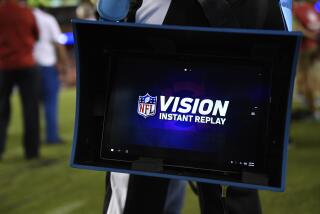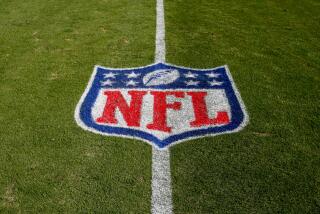NHL considers penalizing blindside hits to head
- Share via
Reporting from Chicago — Shoulder-driven blows to the head of unsuspecting players would be penalized under a proposal being formulated during this week’s meetings of NHL general managers.
Current rules lack specific sanctions for blindside hits, which have been a visible and serious problem for the league. A hit by Pittsburgh’s Matt Cooke Sunday that left Boston’s Marc Savard with a potentially season-ending concussion has crystallized discussions that circled around several points in recent years but never reached consensus to define which hits should be subject to penalties and supplementary discipline.
More discussions will take place before the annual meetings end today in Boca Raton, Fla. For rules to be changed the entire group of general managers must make a recommendation to the competition committee, which is made up of players and executives. That group would forward its recommendations to the Board of Governors for implementation. The process could be completed before next season.
Kings General Manager Dean Lombardi said the subgroup working on the proposal had zeroed in on curbing blindside hits delivered by an opponent’s shoulder.
“There is a responsibility to the hittee, maybe a standard where the guy can’t defend himself,” Lombardi said by phone.
“You can hit with your elbow tucked in but there are circumstances where it’s going to be a penalty. It could be if it’s blindside or there could be a standard of where it happened.”
Lombardi said a crushing hit by Philadelphia’s Mike Richards on Florida’s David Booth this season was discussed at length, as was a shoulder-to-head hit by Calgary’s Curtis Glencross on a vulnerable Chris Drury of the New York Rangers. Drury and Booth each suffered a concussion.
The Drury hit, Lombardi said, “was not an elbow. It looks like we’re going to put some of those into the category of illegal. Maybe the standard is that the guy can’t defend himself.”
Though still subject to change, the new rule would subject offenders to possible suspensions that would lengthen with repeat offenses.
The potential changes come at a time when the NHL is balancing the inherent physical nature of the game against protecting the safety of players who are bigger, stronger and faster than ever.
Paul Holmgren of the Philadelphia Flyers, a member of the subgroup discussing new sanctions, told the Canadian Press that though he likes physical hockey, “There’s some things that made us feel uncomfortable this year, I think all of us. It’s something that we feel we need to address, and that’s what we’re trying to do here.”
Also discussed were proposals that would allow coaches to challenge plays, and changing the tie-breaking formula to give an edge to teams that have more regulation victories instead of the most total wins.
twitter.com/helenenothelen
More to Read
Go beyond the scoreboard
Get the latest on L.A.'s teams in the daily Sports Report newsletter.
You may occasionally receive promotional content from the Los Angeles Times.







